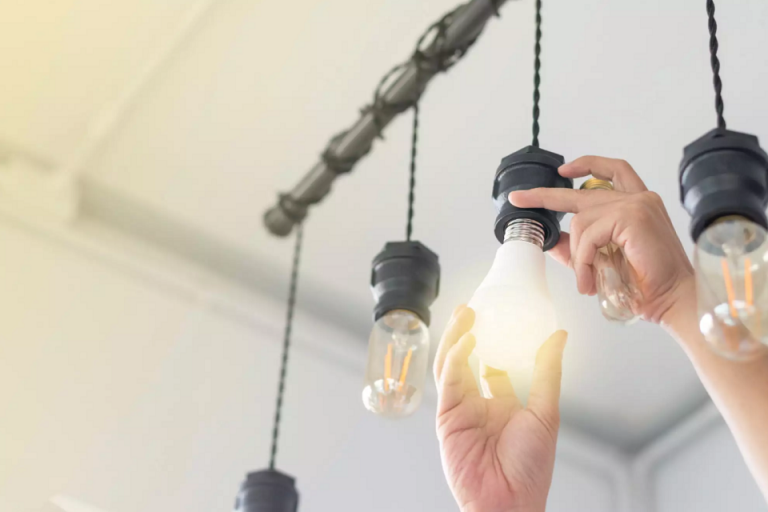“Wait, the kitchen light just went out… “That’s odd,” you mutter absently as you return your attention to whatever you were doing before.
A flickering light is bothersome to most people, and that’s about it.
It’s something you might remark on once or twice before it fades into the background — just another item you reject as ultimately insignificant.
But make no mistake: A flickering light is most certainly something to be concerned about!
So, what should you do if your lights start to flicker? Don’t ignore it. Contact an electrician immediately.
Really? Is it necessary for me to be concerned about flickering lights?
Is it harmful to have lights that flicker?
Flickering lights aren’t only innocuous; they’re often a sign of another more serious electrical problem in your home. Just some of the issues that may be associated with flickering lights are electricity overloads, unexpected electricity surges, risk of fire, frequently tripped switches, increased chance of electrocution. When working with such hazards make sure you have insurance for electricians to protect yourself if an accident was to occur.
What Causes Flickering Lights?
Flickering lights can result from several issues:
1. An Overloaded Circuit
An overloaded electrical circuit might be the cause of your lights flashing when other appliances, such as your washing machine or air conditioning system, are in use.
Electrical circuits are only built to handle a specific amount of electricity at a time; push your circuit past its limitations, and you may notice problems with the power supply, with flickering lights being the most obvious indicator.
When large appliances are switched on, they use more energy. This reduces the amount of energy available to your other appliances, limits their performance and, in the case of lights, causes them to flicker and dim.
The only way to solve this (apart from spacing out appliance usage, which isn’t always possible) is to enlarge and increase the capacity of your electrical circuits.
2. Electrical Wiring That Is Sloppy & Obsolete
The problem with electricity is that it always seeks the shortest path to the ground (which is also what the term “path of least resistance” originally denoted).
This frequently entails “jumping” from the intended circuit. This is why it’s critical to ensure that your electronics and wiring are correctly insulated to avoid this.
Unfortunately, electrical current can “jump” out of its intended channel due to old, worn-out, obsolete, and unsecured electrical cabling.
This might make your lights flicker, but what’s more concerning is that it can significantly raise your danger of electrocution and a house electrical fire!
Because electricity is hot, loose electrical connections generate heat. It can reach a dangerous heating temperature over time, causing damage to the entire electrical system, and inducing the aforementioned fire risk.
Allowing an electrician to evaluate your electrical wire connections is the best method to avoid this, especially if you feel that your old and loose wirings are faulty.
3. Variations In Voltage
Voltage fluctuations, in addition to overloads, can cause lights to flicker.
Your lights, like your electrical circuits, are intended to operate at a specific voltage, and voltage changes and power surges can cause them to flicker.
The following are some telltale symptoms of flickering lights:
- Dimming that was not expected
- Appliances have ceased operating, and the flashing has persisted.
- When you switch on your appliance, there is a constant flicker.
It’s not simply dimming that might impair your lights; unexpected power surges can result in more power flowing through them than your lights were built to manage.
Normally, circuit breakers and other safeguards protect your lights in this situation.
If the problem persists, it may be an indication that these critical safeguards aren’t functioning properly.
If you’re experiencing power fluctuations, it’s advisable to contact an expert to assess the situation.
4. A Loose Light Bulb
If you notice that only one light bulb is flickering the majority of the time, the problem might be limited to that light.
You may check for a loose bulb or a loose connection on the bulb socket in addition to examining the light itself to see whether it’s operating properly.
Lights will flicker as a result of the uneven electrical power received from the primary electrical source, as we’ve established. This is frequently caused by problems with your electrical socket or connection.
Simply screwing and tightening the bulb socket will suffice in these situations. If it still doesn’t function properly, changing the blub may help.
Before changing the bulb, turn off the main light switch for safety’s sake, wait for the blub to cool down, and check for any loose connections, tightening them as needed.
It’s better to be safe than sorry and commit this task to a professional electrician – who knows, they could even be able to assess whether or not your problem is caused by another issue!
5. Malfunctioning Light Switches
A worn and malfunctioning light switch should be changed or fixed as soon as possible, especially if the connection between the switch and the bulb is faulty.
True, this can create flickering; nevertheless, a more concerning issue with them is the possibility of electrocution!
Electricity can “leak” from faulty light switches, causing a shock to anyone who attempts to use them.
Loose electrical wiring causes faulty light switches, which are accompanied by buzzing, popping, and even searing sounds in addition to the aforementioned flickering.
Flickering LED Lights Are Caused By A Variety Of Factors
How about using LED lights? Are the causes of flickering with these lights different than with ordinary light bulbs since they function on a different principle?
Because most causes of flickering have less to do with the lights themselves and more to do with the circuits, sockets, and switches that deliver energy to them, LED lights flicker for the same reasons as traditional lights in the great majority of situations.
When your lights flicker, don’t ignore it or dismiss it as usual — take it from us: lights flickering before reaching full brightness isn’t normal.
Poor lighting and flickering lights are a big source of concern since they not only cause lighting issues but they also signal the presence of electrical risks in your house.
Call a professional and experienced local reputable electrician for your residential or commercial electrical needs to ensure that everything is operating properly.



